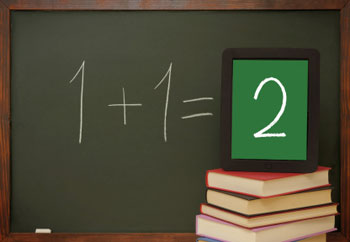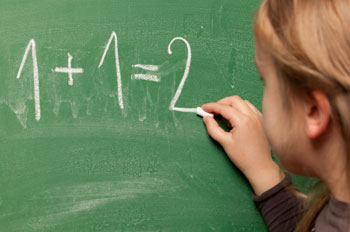What Will My Child Learn in 3rd Grade Math?
Are you looking for some home practice for your 3rd grader? Look no further; below, each of the main focus areas of your 3rd grader's math curriculum are discussed in detail. Once you know what skills to practice, your child will be improving in no time!

Mathematical Focus Areas of 3rd Grade Math
Operations and Algebraic Thinking
In 3rd grade, fluently multiplying and dividing within 100 will be a main focus. Additionally, your child will need to understand and interpret the products and quotients of whole numbers. For example, the problem 2 x 3 = 6 could be modeled with two groups of three items or three groups of two items.
Students in 3rd grade learn to determine an unknown number in a multiplication or division sentence. For instance, in the number sentence 15 ÷ ? = 3, your child should be able to determine that the missing number is five. You will also want to make sure that he or she can solve a 2-step word problem using any of the four operations (addition, subtraction, multiplication and division).
Number and Operations in Base Ten
Within this mathematical focus area, your child will be working to round whole numbers to the nearest ten or 100. This will require your student to have an adequate knowledge of place value. By the end of 3rd grade, your child should be fluently adding and subtracting within 1,000. To ensure your child meets this standard, you may want to provide him or her with daily practice for these two skill areas.
Multiplication will be introduced to your child in 3rd grade. For this focus area, you will want to be sure your student can multiply a 1-digit number by a multiple of ten.
Number and Operations-Fractions
As your 3rd grader begins learning about fractions, you will first want to make sure that he or she understands that a fraction is formed when a whole is divided into equal parts. Similarly, your student should know how to express a whole number as a fraction. Your child will also need to recognize and create equivalent fractions. Familiarize your student with a number line so that he or she feels comfortable comparing fractions with the same numerator or denominator and then plotting the fractions on the line.
Measurement and Data
At the 3rd grade level, your child will be learning to use standard units of measurement to estimate and measure the volume of a liquid and the mass of an object. Your child will also be responsible for knowing how to measure the length of an item using a ruler that shows halves and fourths of an inch. This focus area will require your child to tell and write time to the nearest minute and create an appropriate graph from a given set of data. Lastly, your child should also calculate the area and perimeter of polygons by using addition and multiplication.
Geometry
At the 3rd grade level, your child should recognize a rectangle, a square and a rhombus as being examples of quadrilaterals. You will also want to make sure that your student realizes that it is possible for shapes in different categories to share similar attributes.
Your 3rd grader needs to be able to partition a shape into equal parts, and then express the division of the shape as a unit fraction of the whole. For example, if your child divided a circle into four equal parts, he or she would use the fraction 4/4 to show how the shape was divided.
Other Articles You May Be Interested In
-
MIND Games Lead to Math Gains

Imagine a math teaching tool so effective that it need only be employed twice per week for less than an hour to result in huge proficiency gains. Impossible, you say? Not so...and MIND Research Institute has the virtual penguin to prove it.
-
Should Math Be a Main Focus in Kindergarten?

Should kindergartners put away the building blocks and open the math books? According to recent research, earlier is better when it comes to learning mathematical concepts. But that could put undue pressure on kids, parents and even teachers.
We Found 7 Tutors You Might Be Interested In
Huntington Learning

- What Huntington Learning offers:
- Online and in-center tutoring
- One on one tutoring
- Every Huntington tutor is certified and trained extensively on the most effective teaching methods
K12

- What K12 offers:
- Online tutoring
- Has a strong and effective partnership with public and private schools
- AdvancED-accredited corporation meeting the highest standards of educational management
Kaplan Kids

- What Kaplan Kids offers:
- Online tutoring
- Customized learning plans
- Real-Time Progress Reports track your child's progress
Kumon

- What Kumon offers:
- In-center tutoring
- Individualized programs for your child
- Helps your child develop the skills and study habits needed to improve their academic performance
Sylvan Learning

- What Sylvan Learning offers:
- Online and in-center tutoring
- Sylvan tutors are certified teachers who provide personalized instruction
- Regular assessment and progress reports
Tutor Doctor

- What Tutor Doctor offers:
- In-Home tutoring
- One on one attention by the tutor
- Develops personlized programs by working with your child's existing homework
TutorVista

- What TutorVista offers:
- Online tutoring
- Student works one-on-one with a professional tutor
- Using the virtual whiteboard workspace to share problems, solutions and explanations